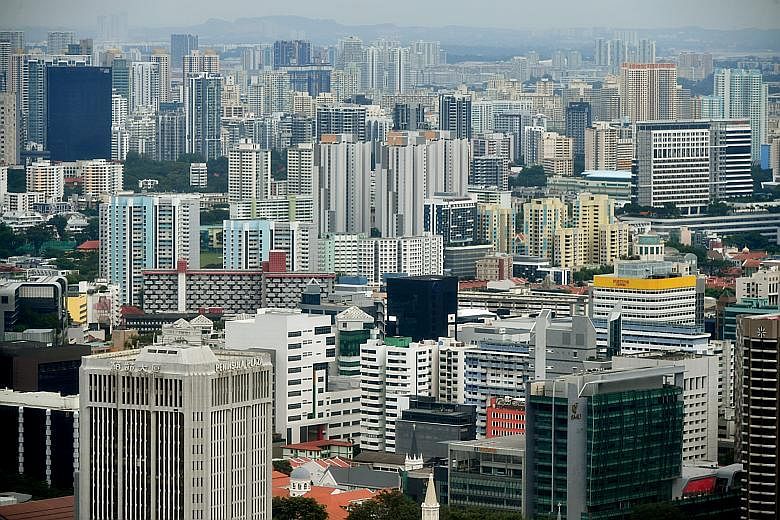SINGAPORE (THE BUSINESS TIMES) - Taxes on privately held wealth could help address issues of widening inequality and contribute a significant sum to Government coffers, but Singapore's reputation as a global wealth management hub might take a hit.
Analysts told The Business Times that it is a tricky tightrope to navigate, even as taxes could take on many forms, ranging from further property taxes to capital gains tax or even the reintroduction of estate tax, which was abolished in Singapore in 2008.
Singapore does not have capital gains tax, which refers to taxes levied on profits from the sale of an investment asset such as equities or bonds. Estate duties, also known as inheritance taxes, are collected from assets left behind after an individual's death.
The possibility of taxes on privately held wealth surfaced on Thursday at the official opening of the new premises of Nanyang Technological University's Wealth Management Institute at one-north.
In off-the-cuff remarks made before his speech at the event, Finance Minister Heng Swee Keat recalled a question posed during The Straits Times Global Forum on Tuesday, where he was asked why Government revenue has to be raised instead of touching Government reserves.
He told the audience on Thursday that he had made the case on how Singapore's reserves were used in times of need such as the Global Financial Crisis as bank guarantees, which led to the continued stability of the Singapore dollar and economic growth.
Mr Heng joked: "I don't know if the person who asked the question was someone from the wealth management industry who thought that I was thinking of taxing wealth and trying to divert me from doing that. Unfortunately he had the opposite effect.
"I had a few people come up to me after that and said: 'Minister Heng, I'm convinced you don't touch sovereign wealth, but what about private wealth'?"
He did not elaborate any further, but it has invited speculation among tax specialists and economists that some form of taxes on private wealth could also be announced in the upcoming Singapore Budget 2018.
Prime Minister Lee Hsien Loong recently said that it is "not a matter of whether, but a matter of when" taxes would have to be raised. The top contenders for a tax hike so far have been the Goods and Services Tax (GST) and e-commerce tax.
With Minister Heng's latest comments on Thursday, the door of possibilities has since widened.
Credit Suisse economist Michael Wan welcomed the idea of a wealth tax, saying: "My view is that higher wealth taxes should definitely be one of the options on the table, besides the oft-mentioned GST."
But analysts say it has to be weighed against a potential negative impact on Singapore's status as a major wealth management and financial hub.
"The concept of 'those who have more, should pay more' is easy to understand but hard to execute," said Goh Siow Hui, partner, Tax Services, Ernst & Young Solutions LLP.
For example, estate duty was abolished in 2008 as it did not achieve the objective of taxing the wealthy more, she added. According to then Finance Minister Tharman Shanmugaratnam, the estate duty affected the "middle and upper-middle-income estates disproportionately compared to wealthier ones".
Mizuho Bank economist Vishnu Varathan explained that this was partly because the truly wealthy would be able to set up trust structures that would avoid the estate duty. But he added that estate tax could be worth revisiting.
"Demographically, we are an ageing population. You see a lot more inheritance taking place as it's a function of our age profile. In addition, the value of the estate being bequeathed will also go up dramatically given that property prices have shot up in the last 20 years," he said.
This means that if estate duty is re-introduced today, it could potentially contribute 1.5 to 2 per cent of Government operating revenue annually, up from an annual average of about 0.6 per cent between 2003 and 2007, Mr Varathan added.
Another form of tax on private wealth could be additional taxes on property, suggested analysts.
Credit Suisse's Mr Wan suggested that rates for property taxes could be raised and made "even more progressive" to further raise tax revenues. He sees changes in property taxes as the most likely wealth tax that could be announced for Budget 2018.
But with property cooling measures already in place since 2009, analysts are mixed about the need for more taxes in the area.
"We want to make sure we are actually posing a wealth tax, rather than a transaction tax. You don't want to over-penalise people," added Mr Varathan.
Another option that analysts put forth is the capital gains tax, which is common in other countries such as the US and Australia.
But according to them, this is the least compelling option as it could affect Singapore's competitive edge as a private wealth management capital by creating frictional costs in transactions and could even dissuade mergers and acquisitions.
EY's Ms Goh said: "The imposition of any tax that is solely targeted at the level of personal or private wealth could run counter-intuitive to the efforts that the Singapore Government has put in place in the last decade, to develop Singapore into the premier hub for wealth management in Singapore, attracting foreign investors to work and live."
Even as the Singapore tax system aims to be a progressive one, analysts say that it should not get to the point where the wealthy get overly squeezed.
Mr Varathan quipped: "It's always tempting to say: There's so much wealth in Singapore, can we tax that? But we don't want a case of slaughtering the golden goose. The real thought behind is to make society more equitable, and not appear anti-wealth per se."


